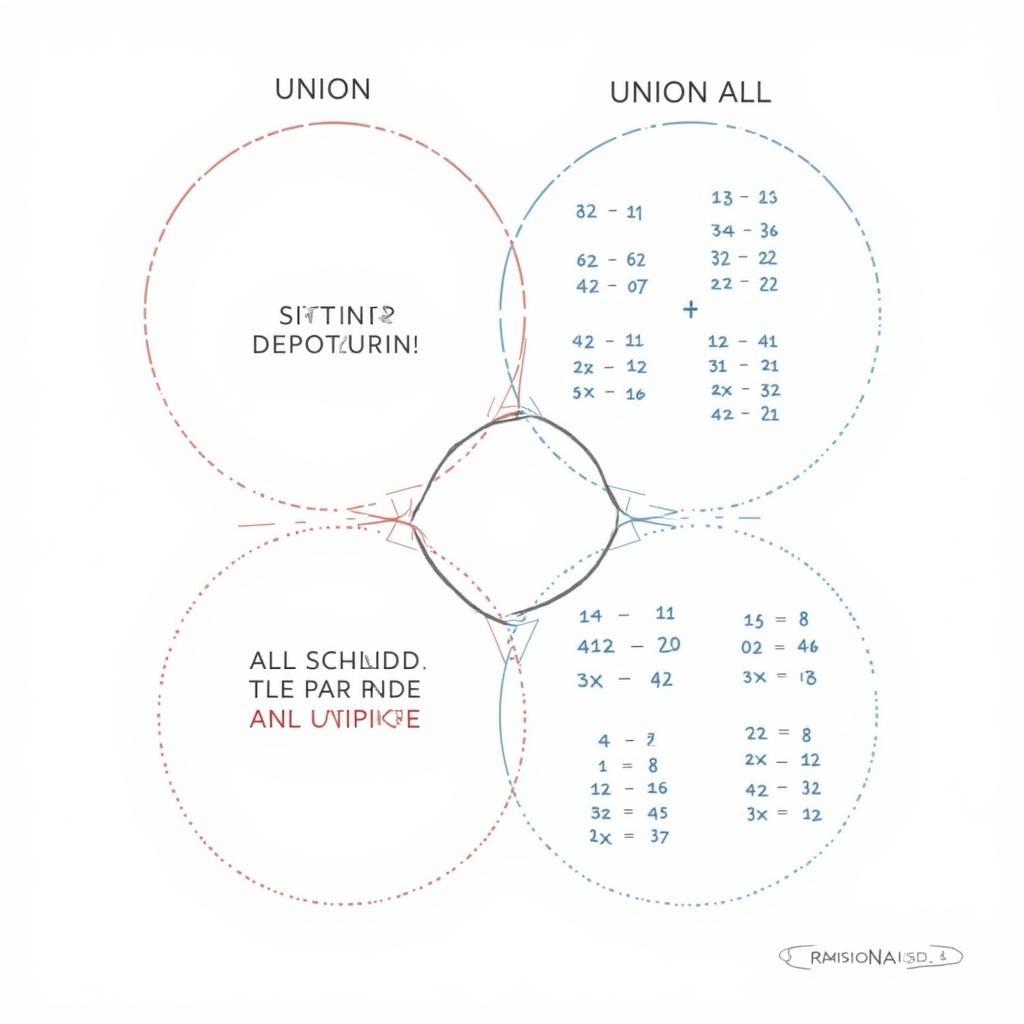MySQL’s UNION and UNION ALL are powerful tools for combining data from multiple SELECT statements. Understanding the nuances between these two commands is crucial for writing efficient and accurate SQL queries. This article delves into the core differences between UNION and UNION ALL, providing practical examples and scenarios to help you choose the right command for your needs.
 So sánh MySQL UNION vs UNION ALL
So sánh MySQL UNION vs UNION ALL
Understanding UNION
The UNION operator combines the result sets of two or more SELECT statements into a single result set. Crucially, UNION eliminates duplicate rows, ensuring the final output contains only unique records. This deduplication process adds overhead, making UNION slightly slower than its counterpart, UNION ALL. However, the guarantee of unique results often outweighs the performance cost.
For instance, imagine you have two tables, one listing players from Team A and another listing players from Team B. Using UNION would provide a combined list of all players, removing any duplicates if a player is on both teams.
 Ví dụ về toán tử MySQL UNION
Ví dụ về toán tử MySQL UNION
Exploring UNION ALL
UNION ALL performs a similar function to UNION, combining result sets from multiple SELECT statements. The key difference is that UNION ALL retains all rows, including duplicates. This lack of deduplication makes UNION ALL significantly faster than UNION, especially when dealing with large datasets. However, if duplicate data is a concern, UNION is the preferred choice.
Consider the same scenario with Team A and Team B. Using UNION ALL would list all players from both teams, even if a player appears in both lists. This could be useful if you wanted to see the total number of player entries, including duplicates.
When to Use Which
Choosing between UNION and UNION ALL depends on your specific needs. If you need distinct results and performance isn’t a primary concern, use UNION. If speed is paramount and duplicate rows are acceptable, use UNION ALL.
What are the performance implications of using UNION vs UNION ALL?
UNION is slower due to the overhead of removing duplicates. UNION ALL is faster as it simply combines the results without checking for duplicates.
Can I use UNION and UNION ALL with more than two SELECT statements?
Yes, you can use both UNION and UNION ALL with multiple SELECT statements by chaining them together.
Do the SELECT statements within a UNION or UNION ALL need to have the same number of columns?
Yes, all SELECT statements must retrieve the same number of columns.
Must the data types of corresponding columns in the SELECT statements be the same?
The data types of corresponding columns should be compatible. MySQL will attempt to perform implicit conversions if possible, but it’s best practice to ensure consistency.
Key Differences Summarized
| Feature | UNION | UNION ALL |
|---|---|---|
| Duplicate Rows | Removed | Retained |
| Performance | Slower | Faster |
| Use Case | Unique Results | All Results, including duplicates |
In conclusion, both UNION and UNION ALL are valuable tools in a SQL developer’s arsenal. Choosing the right one comes down to understanding the trade-off between performance and data integrity. Choose wisely based on your specific requirements. See also our articles on mysql union all vs union, evangelical vs catholic and ukraine vs russia war. Understanding these concepts will improve your ability to work with data effectively. And while you’re at it, you might be interested in our article on creditor vs lender or perhaps ash vs evil dead 1.
FAQ
- What is the primary difference between
UNIONandUNION ALL? - Which operator is faster:
UNIONorUNION ALL? - When should I use
UNION? - When should I use
UNION ALL? - Can I use
ORDER BYwithUNIONandUNION ALL? - What happens if the data types of columns don’t match in a
UNIONorUNION ALLoperation? - How can I handle NULL values when using
UNIONorUNION ALL?
For further assistance, please contact us at Phone Number: 02838172459, Email: [email protected] or visit our address: 596 Đ. Hậu Giang, P.12, Quận 6, Hồ Chí Minh 70000, Việt Nam. We have a 24/7 customer support team.